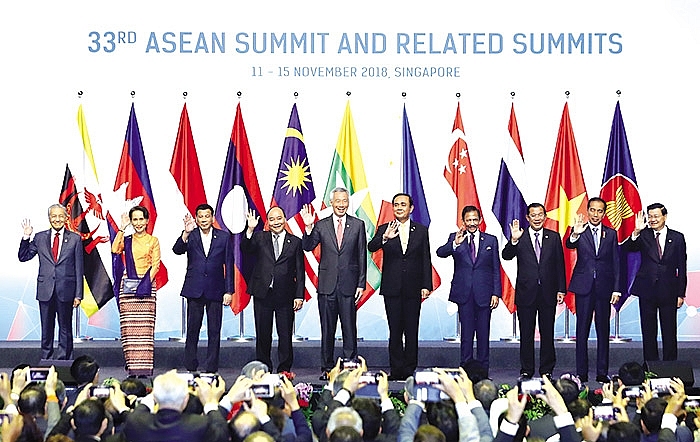Green-lighting ASEAN hopes and dreams
 |
| Prime Minister Nguyen Xuan Phuc (fourth from left) and other ASEAN leaders at the opening ceremony of the 33rd ASEAN Summit in Singapore, photo VNA |
Prime Minister Nguyen Xuan Phuc, together with other leaders from ASEAN member countries, attended the plenary session of the 33rd ASEAN Summit and related meetings in Singapore. He reiterated Vietnam’s initiatives on a regional digital platform, a cross-ASEAN mobile network, establishing the ASEAN Technology University, and a regional disaster alert system.
At the plenary session of the World Economic Forum on ASEAN in Hanoi on September 12, the prime minister also suggested several intra-regional partnership mechanisms in several fields pertinent to Industry 4.0. He called for a regional data sharing mechanism and a cross-ASEAN mobile network, saying that “data is the cornerstone of Industry 4.0.”
PM Phuc regards the small- and medium-sized enterprise community as “the backbone of the ASEAN economy,” and recommended establishing a talent incubator, saying that a startup atmosphere is “truly permeating the region” as “the ASEAN is known as the cradle of many new and innovative ideas around the world.”
In its development strategy, Vietnam has considered ICT development as a key to develop its digital economy, which will contribute to materialising the region’s development goals.
Themed “Building a Resilient and Innovative ASEAN,” the 33rd ASEAN Summit saw leaders discuss ways to promote ties, including increased co-operation in economy, trade, and infrastructure development; strengthening connectivity; working to cope with the changes in the global economy; and adapting to Industry 4.0 and addressing other global challenges.
PM Phuc, together with other regional leaders, passed seven agreements related to smart city, climate change and post-disaster recovery, and green employment for the ASEAN Community’s inclusive and equal development.
Notably, the adoption of the framework on smart cities will push the ASEAN Smart Cities Network (ASCN) initiated by Singapore closer to materialisation in the near future.
Vietnam has nominated its three cities of Hanoi, Danang, and Ho Chi Minh for pilot development under the ASCN. The ASCN’s concept note was adopted by the 32nd ASEAN Summit, also in Singapore, this past April. The ASCN, including the names of 26 cities, is envisioned as a collaborative platform where three cities per ASEAN member country work towards a common goal of smart and sustainable urban development.
“The ASCN will attract the participation of multilateral financial institutions such as the World Bank, the Asian Development Bank, and the Asian Infrastructure Investment Bank, as well as the Global Infrastructure Hub and global investors,” a representative from Vietnam’s Ministry of Foreign Affairs told VIR. “Vietnam will need to develop action plans for its three cities before they can be considered for funding and investment by development partners and investors.”
The action plans will contain specific projects and actions that Vietnam will undertake from now until 2025, in its desired areas of focus.
Under the ASCN, smart city development covers many sectors such as transport, water quality, energy, healthcare, education, public services, and information and communications technology. In light of the often-differing priorities of cities, the ASCN will be designed to allow members to focus on areas that matter to them, in line with each city’s local and cultural context.
Like the other 23 regional picks, Hanoi, Danang, and Ho Chi Minh City will be linked up with private sector solution providers to kick-start practical and commercially viable projects with tangible outcomes. They will also pair up with specific external partners on a voluntary basis, and form mutually beneficial partnerships to drive smart city development.
What the stars mean:
★ Poor ★ ★ Promising ★★★ Good ★★★★ Very good ★★★★★ Exceptional
Related Contents
Latest News
More News
- Russian President congratulates Vietnamese Party leader during phone talks (January 25, 2026 | 09:58)
- Worldwide congratulations underscore confidence in Vietnam’s 14th Party Congress (January 23, 2026 | 09:02)
- Political parties, organisations, int’l friends send congratulations to 14th National Party Congress (January 22, 2026 | 09:33)
- 14th National Party Congress: Japanese media highlight Vietnam’s growth targets (January 21, 2026 | 09:46)
- 14th National Party Congress: Driving force for Vietnam to continue renewal, innovation, breakthroughs (January 21, 2026 | 09:42)
- Vietnam remains spiritual support for progressive forces: Colombian party leader (January 21, 2026 | 08:00)
- Int'l media provides large coverage of 14th National Party Congress's first working day (January 20, 2026 | 09:09)
- Vietnamese firms win top honours at ASEAN Digital Awards (January 16, 2026 | 16:45)
- ASEAN Digital Ministers' Meeting opens in Hanoi (January 15, 2026 | 15:33)
- ASEAN economies move up the global chip value chain (December 09, 2025 | 13:32)

 Tag:
Tag:




















 Mobile Version
Mobile Version